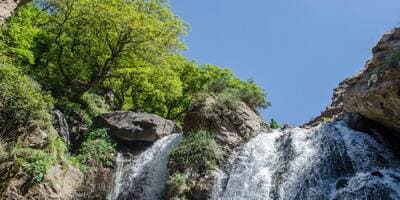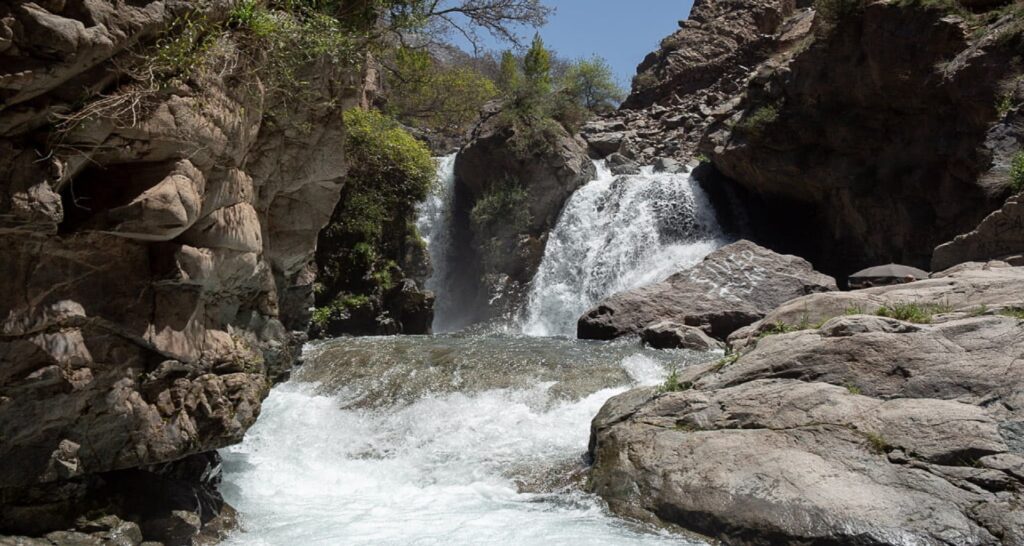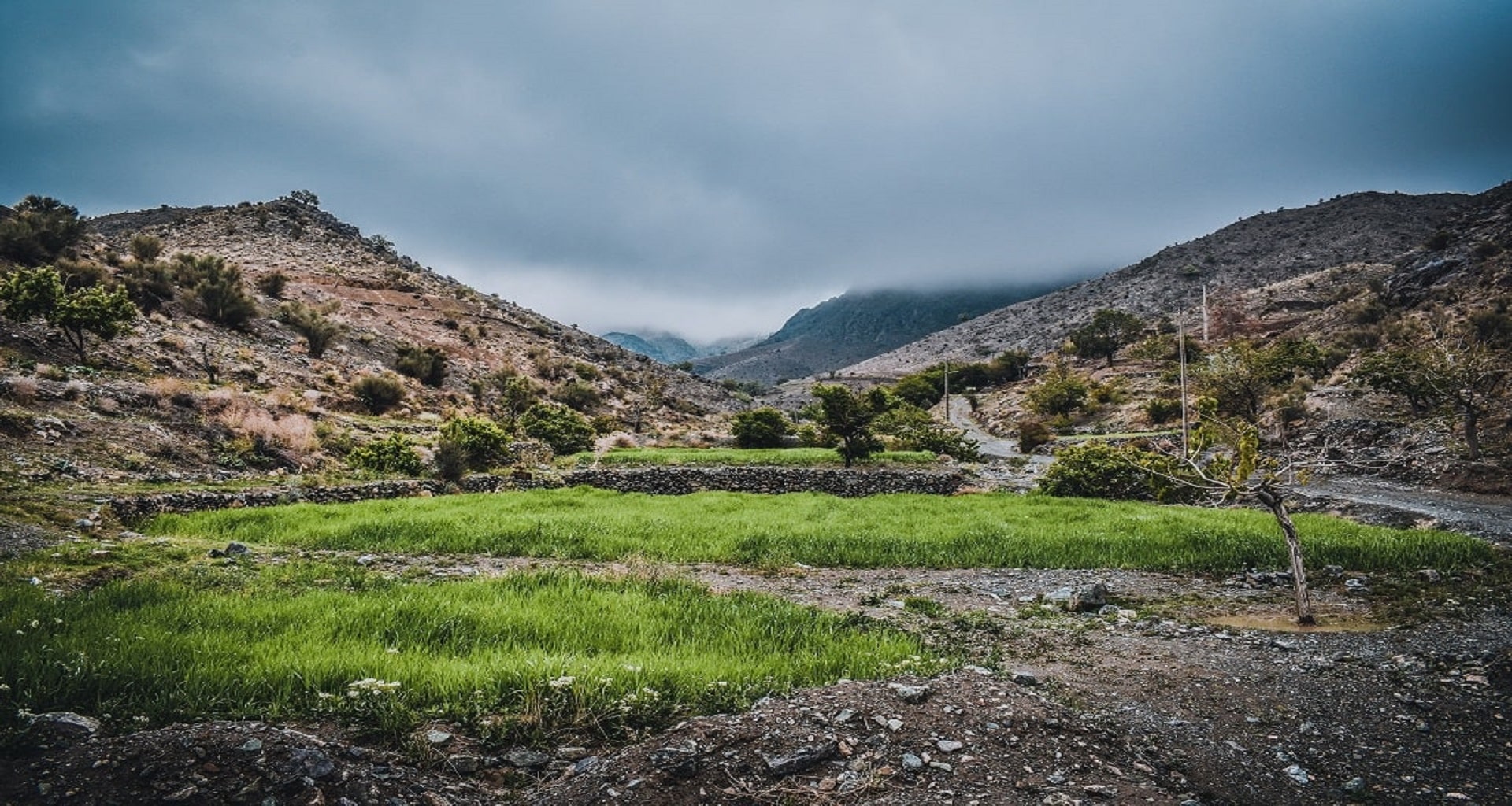Nestled deep within the High Atlas Mountains, Imlil is a small yet vibrant Berber village that serves as a hub for adventurers, nature lovers, and cultural explorers. Located just 64 km from Marrakech, it is the primary base for those looking to hike Mount Toubkal, the highest peak in North Africa. The village is surrounded by dramatic landscapes, including lush valleys, walnut groves, and snow-capped peaks, making it a haven for nature enthusiasts and trekkers alike .
Unlike the bustling city of Marrakech, Imlil village offers tranquility and an authentic glimpse into traditional Berber culture. The village is home to mud-brick houses, narrow winding paths, and a close-knit community that welcomes visitors with open arms. Many travelers come here not only for the trekking opportunities but also to immerse themselves in the unique cultural heritage of the Amazigh people who have lived in this region for centuries.
Why Visit Imlil?
Imlil serves as the gateway to Mount Toubkal, North Africa’s highest peak, making it one of the most popular trekking destinations in Morocco. The journey from Imlil to Toubkal is challenging yet rewarding, offering breathtaking views and a sense of accomplishment for those who reach the summit. Several mountain refuges provide accommodation for trekkers preparing for their ascent. The surrounding valleys, including Azzaden Valley and Tizi N’Mezzik Mountain Pass, also offer picturesque trails suitable for all levels of hikers.

Beyond the climb to Toubkal, Imlil itself is a paradise for outdoor enthusiasts. The valley is filled with scenic trails, lush greenery, and panoramic views that attract visitors from around the world. Whether you are looking for a short day hike or a multi-day adventure, Imlil has something to offer for everyone.
Discover Berber Traditions.
Unlike more commercialized destinations, Imlil Berber village remains deeply connected to its traditions. The village has retained its authentic way of life, offering visitors a unique cultural experience. Local families welcome guests into their homes, where they can enjoy traditional home-cooked meals like tagine and couscous. Staying in a Berber guesthouse provides an opportunity to experience the warmth and hospitality of the Amazigh people firsthand.
Visitors can also explore traditional Berber markets, where artisans sell handmade carpets, pottery, and jewelry. These markets are a great place to learn about the craftsmanship that has been passed down through generations. A visit to the Kasbah du Toubkal, a beautifully restored fortress, offers insight into the architectural heritage of the region and provides stunning views of the surrounding mountains.


Explore the Stunning Nature of the Atlas Mountains.
Imlil is not just about hiking; it is also a destination for those who appreciate the beauty of nature. The Imlil Waterfall is a must-visit spot, offering a serene escape and a perfect place to cool off after a long hike. The surrounding valleys are home to lush orchards of apples, walnuts, and cherries, adding to the region’s agricultural richness. Toubkal National Park, which encompasses the village, boasts diverse flora and fauna, including the endangered Barbary sheep and golden eagles.
For those traveling with family, Imlil with kids is an excellent option, as the village offers easy trekking routes and mule rides that children can enjoy. The picturesque landscapes, combined with the welcoming nature of the locals, make it an ideal destination for a relaxing retreat in the heart of the Atlas Mountains.
How to Get to Imlil.
Reaching Imlil from Marrakech is relatively simple and can be done in several ways. The most convenient option is to hire a private taxi, which takes approximately two hours. Grand taxis, which are shared vehicles, are also available from Bab er-Robb in Marrakech and provide a more budget-friendly option. For those looking for an adventure, renting a car offers the flexibility to explore the region at their own pace.
The journey to Imlil is as picturesque as the destination itself. The route passes through the bustling market town of Asni and continues along winding mountain roads that offer breathtaking views of the valleys below. Along the way, visitors may catch glimpses of traditional Berber villages perched on the hillsides, blending seamlessly into the natural landscape.
Excursions and Trips Around Marrakech: Discover the Beauty Beyond the City.


Best Time to Visit Imlil.
Imlil experiences a varied climate throughout the year, making it a year-round destination for travelers. The best time to visit depends on the type of experience you are looking for. Spring (March-May) is ideal for hiking, as the weather is mild and the valleys are lush and green. Summer (June-August) is warm, providing a great escape from the intense heat of Marrakech. Autumn (September-November) offers cooler temperatures and stunning fall colors, making it a photographer’s dream. Winter (December-February) transforms the landscape into a snowy wonderland, attracting those interested in winter trekking and mountaineering.
Regardless of the season, it is important to be prepared for changing weather conditions, especially when hiking in the mountains. Proper gear, including sturdy footwear, warm clothing, and sun protection, is essential for a comfortable and enjoyable visit.
Safety and Travel Tips.
When visiting Imlil, it is important to keep a few safety tips in mind. Hiring a local guide for trekking is highly recommended, as the trails can be challenging and difficult to navigate for those unfamiliar with the terrain. Since 2019, hiring a guide has been mandatory for those trekking to Mount Toubkal to ensure the safety of visitors.
There are no ATMs in Imlil, so it is advisable to bring enough cash for your stay. Additionally, altitude sickness can be a concern for some visitors, especially those not accustomed to high elevations. Taking time to acclimate and staying hydrated can help prevent symptoms. Dressing modestly is also recommended, as it shows respect for local customs and traditions.
The scenery in the Atlas Mountains is breathtaking, offering a refreshing escape from the heat of Marrakech. We stopped for a delicious lunch and had the pleasure of sharing great conversation with Hassan and Jamal’s family, making the experience even more special. If you’re considering a trip into the Atlas Mountains, I highly recommend going with Imlil Trek—and if time allows, staying for more than just a day to fully appreciate the beauty and tranquility of the region.
Imlil is a picturesque village in Morocco’s High Atlas Mountains, about 70 km south of Marrakech.
You can reach Imlil from Marrakech by car via the P2009 road, which takes around 1.5 hours. Shared taxis also operate from Marrakech to Asni, where you can transfer to another taxi heading to Imlil.
Imlil is the gateway to Mount Toubkal, North Africa’s highest peak. Visitors can also explore the surrounding valleys, such as the Imnane and Azzaden Valleys, or experience Berber culture by staying in traditional guesthouses.
The ideal time to visit Imlil is between April and October when the weather is perfect for hiking and outdoor activities. Summer offers cooler temperatures in the mountains, while spring and autumn provide ideal trekking conditions.
Yes, Imlil offers a range of accommodations, from traditional guesthouses to small hotels. Many visitors prefer staying in family-run lodges for an authentic experience.
While experienced hikers can climb Mount Toubkal independently, hiring a local guide is highly recommended for safety and to gain deeper insights into the region’s landscape and culture.
Imlil has a mountain climate. Summers are mild with pleasant daytime temperatures and cool nights, while winters can be cold with frequent snowfall at higher elevations.
Yes, Imlil has several restaurants and cafés serving traditional Moroccan cuisine. Many accommodations also offer meals made with fresh, local ingredients.
Imlil sits at approximately 1,740 meters (5,700 feet) above sea level, making it an ideal starting point for high-altitude hikes.
For hiking in Imlil, it’s essential to wear sturdy hiking boots, dress appropriately for the weather, bring sun protection, and carry enough water. If you plan to climb Mount Toubkal, additional gear may be needed, especially in winter.


